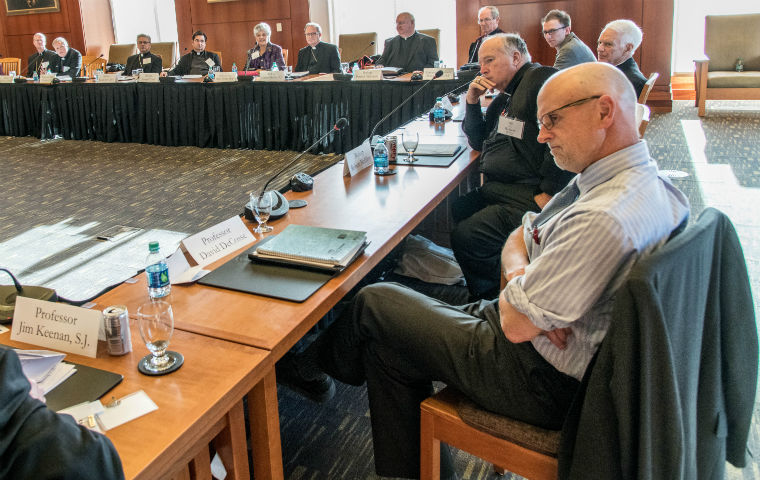
Pope Francis and Accompanying Families
In late February Santa Clara University hosted a remarkable meeting: A gathering of Catholic bishops and theologians to discuss pastoral strategies for implementing Pope Francis' groundbreaking document on the family, Amoris Laetitia (translation, "the Joy of Love").
Eleven bishops attended the conference events February 22-23, with SCU President Michael Engh, S.J., serving as host. They met with 19 theologians and pastoral workers in the Church, led by James Keenan, S.J., a moral theologian from Boston College. SCU theologians present at the meeting were Sister Ana Maria Pineda, R.S.M., Karen Peterson-Iyer, Paul Crowley, S.J., and myself, along with theologians from SCU’s Jesuit School of Theology Lisa Fullam, William O'Neill, S.J., and Thomas Massaro, S.J.
Amoris Laetitia has drawn special attention in the Catholic world because the document argues that in particular circumstances Catholics who are divorced and remarried without an annulment may receive communion. This provision was addressed at the conference, especially in a talk by canon lawyer Monsignor John Alesandro of the Diocese of Rockville Centre, N.Y., who argued that the document was advancing a view of marriage as a sacrament that involves the growth of a couple's love.
But the participants at the meeting also insisted that the document was about far more than the controversial question of remarriage and communion. Instead, in a format that involved brief presentations followed by open discussion among bishops and theologians, a wide range of ground-level concerns were raised that related to families of many different types.
For instance, how should the Catholic Church reach out about family to the "nones," the young people today who profess no religious affiliation at all? Within the Church, how can the Church minister more effectively to families facing major economic challenges; to families emerging from different cultural contexts, whether, for instance, Latinx or African-American; and to LGBT Catholics?
Most of all, the group reflected on how the Church can take up Pope Francis' call that the Church "accompany" families of every different type on what for each family is a journey.
"Accompaniment," many noted, is new and isn't easy. Catholicism has thrived for centuries on a top-down model of clerical direction and lay obedience. But "accompaniment" asks for something much more demanding and rewarding: being present in love and support to the particular conditions and challenges of each family.
The meeting at Santa Clara University was one of three such meetings held during the week of February 19 across the United States: one at Boston College; another at the University of Notre Dame; and the third at SCU. The meetings were conceived by Cardinal Blase Cupich of Chicago and Prof. Keenan as ways to engage more of the Church in a conversation about Amoris Laetita.
The bishops in attendance included Patrick McGrath of San Jose; Robert McElroy of San Diego; Michael Barber, S.J. of Oakland; Archbishop Paul Etienne of Anchorage, Ala., and bishops from Cheyenne, Wyo., to Yakima, Wash.
The National Catholic Reporter carried a story about the events, which is accessible online.
Photo by Charles Barry